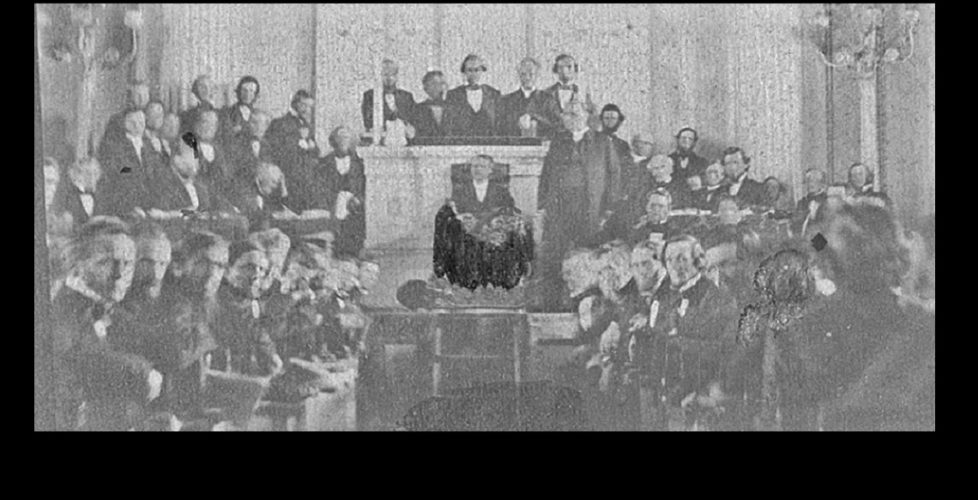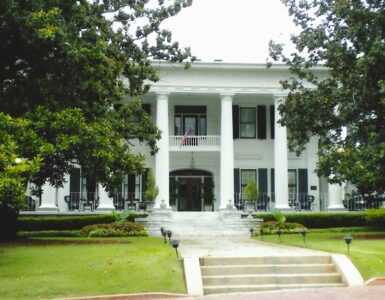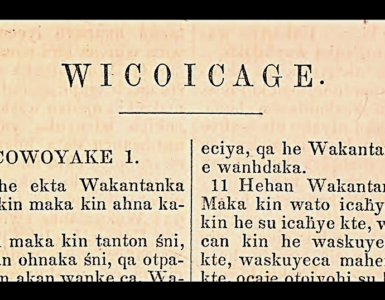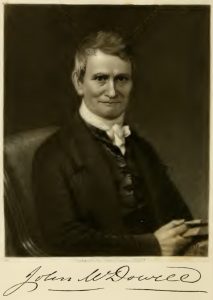 John was born to Matthew and Elizabeth (Anderson) McDowell in Bedminster, New Jersey, September 10, 1780. His ancestors were Scots implanted in Ulster by James I in the seventeenth century. He was baptized and raised in the Presbyterian Church in Lamington. After morning worship services, the McDowell children were catechized, directed in Scripture memorization, and then required to summarize in their own words the pastor’s sermon that morning (a good idea). This regimen for the children began as soon as each one could speak. John memorized the Shorter Catechism by the age of five and during his early adolescent years he felt called to the ministry even though he had not yet become a communing church member. Education was not easy for John to obtain because of his chores on the family farm. His younger brother William McDowell would find the same challenges receiving a proper education. John wanted to attend a classical school but since there was not one within walking distance and his father would not pay board, he took a greater role on the farm while studying on his own until Rev. William Boyd opened a local school. He was not a brilliant student but worked hard and progressed in his studies.
John was born to Matthew and Elizabeth (Anderson) McDowell in Bedminster, New Jersey, September 10, 1780. His ancestors were Scots implanted in Ulster by James I in the seventeenth century. He was baptized and raised in the Presbyterian Church in Lamington. After morning worship services, the McDowell children were catechized, directed in Scripture memorization, and then required to summarize in their own words the pastor’s sermon that morning (a good idea). This regimen for the children began as soon as each one could speak. John memorized the Shorter Catechism by the age of five and during his early adolescent years he felt called to the ministry even though he had not yet become a communing church member. Education was not easy for John to obtain because of his chores on the family farm. His younger brother William McDowell would find the same challenges receiving a proper education. John wanted to attend a classical school but since there was not one within walking distance and his father would not pay board, he took a greater role on the farm while studying on his own until Rev. William Boyd opened a local school. He was not a brilliant student but worked hard and progressed in his studies.
John’s formal preparation for the ministry began when he entered the College of New Jersey (Princeton) in the fall of 1799. He had overcome challenges to his preparatory studies through persistence, then matriculated with the junior class, and finally graduated with honors in September 1801. Initially, he studied theology with Rev. H. W. Hunt in Newton, New Jersey, but then he accepted the opportunity to study further with John Woodhull, who was one of the key Presbyterian leaders and educators of the era. Studies with Woodhull extended beyond books, the Bible, and languages because McDowell saw first-hand the work of a pastor. He was received into church membership on profession of faith and within a few weeks was taken under care as a ministerial candidate by the Presbytery of New Brunswick. The Presbytery of Basking Ridge licensed him to preach April 25, 1804. W. B. Sprague’s biographical volume about McDowell commented regarding his time with Woodhull.
The time of his sojourn with Dr. Woodhull seems to have passed very pleasantly as well as very profitably. He lived with him as a son with his father, not only receiving from him daily theological instruction, but gathering from his large experience and mature wisdom many maxims and principles of conduct, which had much influence on his subsequent life. While he was a most diligent student, he was very careful in the keeping of his own heart, and the culture of all the Christian graces, and especially of a habit of devotion. (6)
McDowell was a faithful participant in worship services at Woodhull’s church in Freehold and attended weekly meetings known as societies. A society is similar to a home Bible study or fellowship gathering today. His first sermon was delivered in Kingston during the absence of Pastor David Comfort, and the next Lord’s Day he returned to the church of his youth in Lamington to lead worship. Presbytery appointed him to supply churches in northern New Jersey and neighboring Pennsylvania, which provided opportunities for congregations to consider calling him to their vacant pulpits.
Henry Kollock resigned the Presbyterian Church in Elizabethtown in 1803 and shortly thereafter a former minister named David Austin visited. Austin’s call had gone well until he adopted an eschatology that set the date for Christ to return in 1796. His failed prediction did not stop him from persisting in his teaching. Tension and controversy arose within the congregation resulting in a petition to presbytery for help. His call was dissolved by presbytery and Austin headed for Connecticut. When Kollock left Elizabethtown, Austin saw his chance to return and possibly regain influence in the church. He negotiated with the church and contracted to minister for a trial period of three months. It appears the presbytery was excluded from the relationship. When the term ended the ballot to renew his contract failed by one vote. As one might expect, it split the congregation. Austin and his followers left and rented the Methodist church building for their services. This was the challenging situation when McDowell was offered the call to Elizabethtown. He would have to be a peacemaker.
McDowell’s first experience in Elizabethtown was a brief term as supply. When he stood before the congregation it was easy to see the results of the split created by Austin because the pews were half empty. The congregation was impressed with McDowell and engaged him for four more Lord’s Days that were followed by a unanimous call issued July 29, 1804. None of those who left with Austin returned to the church yet. McDowell accepted the call and was ordained and installed by the Presbytery of New York, December 26, 1804. Interestingly, that same day Austin preached his farewell sermon to his followers. Did he realize any hope to become minister of Elizabethtown was diffused by the installation of McDowell, or had he realized that continuing was divisive, and he thought it was time to give up? A certain answer cannot be given, but it is likely the former rather than the latter.
One might think that all the problems were resolved with a called pastor in the Elizabethtown pulpit, but the seceded group did not have a minister which resulted in an uneasy situation. Sprague described the seceders as “legitimate members who had put themselves into an attitude of ecclesiastical revolt” (13). It would have been a difficult situation for an experienced minister and was likely a great challenge for twenty-four-year-old McDowell. Another aspect of his task was filling the shoes of Henry Kollock whose preaching ability could be surpassed by few; every time McDowell entered the pulpit there would be remembrance of Kollock. Another issue was some of Kollock’s family members lived in town. On the one hand, the family presence could be difficult if they challenged McDowell, but on the other hand, he met Henrietta Kollock and within a few days the date for marriage was set. Henry conducted the marriage ceremony, February 5, 1805. John and Henrietta moved into the manse and set up house for what would be an extended stay.
The pastoral challenges facing McDowell would be difficult to resolve, but his personal discipline, commitment to peacemaking, and persistence working through his plan of ministry brought fruit. Opposing achievement of his plan was the return of congregants who left with Austin. The prodigals were unenthused about McDowell but through his patient work they would be welcomed home. Pastor John had to unite the divided flock as he followed his plan. The plan is intimidating. Elizabethtown’s congregation was distributed over a parish of several miles. It is the first decade of the nineteenth century when transit was by horseback, wagon, or foot, and if a stream or lake blocked the route then a boat for crossing was needed when a bridge or ferry was not available. On Sabbaths he preached twice and taught regularly in the evenings; a Bible study class was held on Wednesdays; Thursday afternoons were occupied with family visitation which included catechizing the children in the rural areas of his parish; and then on Friday evenings he preached in the church lecture room. His catechetical program developed to include as many as two-hundred children in attendance. It is an ambitious plan even for a twenty-first century pastor with an automobile, however, this was not all that McDowell did. He visited the sick, the shut ins, and when cholera hit the city in 1832, McDowell called on its victims during what was described as an “awful visitation” of the epidemic. On a regular schedule McDowell and an elder visited every family in the congregation. He often chatted with people in the streets and visited those who were curious about Christ. For the youth of the church, he held a class studying the Bible and church history (a good idea). He followed his plan for ministry for nearly thirty years in Elizabethtown.
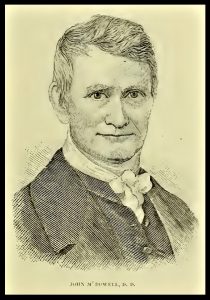 In 1820, John McDowell was elected moderator of the General Assembly held in Second Church, Philadelphia. Among his committee appointments was giving his brother William a seat on the committee examining the minutes of the Synod of South Carolina and Georgia. Some of the topics that came before McDowell included: promoting Psalmody, not in the sense of Psalms alone but including hymns and sacred songs; educating poor and pious youth for the ministry; advising all “bishops, elders, and deacons of the Presbyterian Church” to purchase copies of the Digest of the Acts of the General Assembly; agreeing to the PCUSA having a limited cooperative agreement with the Associate Reformed Presbyterian Church; and deciding after considerable debate to adopt several revisions to the Form of Government. The statistical report received by the General Assembly listed 1299 churches, 108 licentiates, 741 ministers, and 63,997 members gathered in 53 presbyteries. Note that about half the churches had ministers and some churches had more than one. When Moderator McDowell ended the sessions, they had extended for twelve days from convening to adjournment.
In 1820, John McDowell was elected moderator of the General Assembly held in Second Church, Philadelphia. Among his committee appointments was giving his brother William a seat on the committee examining the minutes of the Synod of South Carolina and Georgia. Some of the topics that came before McDowell included: promoting Psalmody, not in the sense of Psalms alone but including hymns and sacred songs; educating poor and pious youth for the ministry; advising all “bishops, elders, and deacons of the Presbyterian Church” to purchase copies of the Digest of the Acts of the General Assembly; agreeing to the PCUSA having a limited cooperative agreement with the Associate Reformed Presbyterian Church; and deciding after considerable debate to adopt several revisions to the Form of Government. The statistical report received by the General Assembly listed 1299 churches, 108 licentiates, 741 ministers, and 63,997 members gathered in 53 presbyteries. Note that about half the churches had ministers and some churches had more than one. When Moderator McDowell ended the sessions, they had extended for twelve days from convening to adjournment.
McDowell was committed to the educational work of the Presbyterians. When the seminary at Princeton was established in 1812, he was appointed to its Board of Directors and continued till his death serving as the Board’s vice president 1821-1824 and the secretary 1812-1860; when the seminary was incorporated in 1822, he served on the first Board of Trustees until his death with thirty-six years as secretary. In 1814, he began a thirty-nine-year tenure as a trustee of the College of New Jersey. He was offered teaching positions in two denominational seminaries. The first opportunity came from Western Theological Seminary in Allegheny, Pennsylvania, 1828, when he was elected professor of ecclesiastical history and church government by the General Assembly, but he declined. The second prospect for teaching was in the summer of 1831 when Union Theological Seminary in Virginia was seeking a professor of church history and polity. McDowell learned that he was a candidate. The seminary was operated by the synods of North and South Carolina which meant his appointment had to be approved by both. Note the difference here that Princeton was governed by the General Assembly while Union was directed by synods. The urgency of the issue before Union increased greatly because of the death of Professor of Theology John H. Rice. McDowell’s friend and Princeton Seminary colleague, Archibald Alexander, wrote a letter of recommendation to the pastor of First Church, Richmond, William S. Plumer, who was on Union’s Board of Directors.
I do not perceive how you could obtain a better man than Dr. McDowell. He has fervent piety, decision of character, energy of action, and excellent habits of business. If he were younger, his literary career might be brighter; but he is sound in the Faith; a Confession of Faith man, through and through; and a pungent, powerful, practical preacher, who will soon make the people forget his notes. You must have a man of energy, who fears no labors, and who can win the affections of the pious people. Dr. McDowell is the man.
With such a glowing recommendation, how could Plumer and Union not choose him? The call was issued, McDowell resigned the Elizabethtown call and was then dismissed by his presbytery to the one in Virginia. But a problem developed. As the move to Virginia approached, Henrietta became concerned about living away from the northeast and was reluctant to accept what she believed were the deprivations of country living. McDowell came to realize the move would not work, so he sent a letter rescinding acceptance of the position to the search committee at Union. To say the least, the committee was not happy and it rebuked McDowell because it had to start the search process all over again. It was not the first nor last time Union’s rural location made it difficult to obtain personnel; the problem was a contributing factor for the decision to relocate the campus to Richmond in 1898.
Shortly after his fifty-second birthday in 1832, McDowell received a letter from a new church in Philadelphia. The congregation was seeded by members of the Arch Street Church who had met for their first service in the Franklin Institute in May with Aaron W. Leland of First Church, Charleston, South Carolina, presiding. Just one month later, the group was organized the Central Presbyterian Church. Architectural plans were drawn up immediately with construction beginning post haste. McDowell’s candidacy consisted of leading worship for a single service that included administration of the Lord’s Supper. Central voted unanimously to call McDowell. A bit reluctantly but with great anticipation he accepted the new opportunity. It was a difficult time for him and the Elizabethtown congregation because thirty years of ministry had produced many attachments within the flock and among other residents of Elizabethtown. He delivered a farewell sermon May 12, 1833, then packed up to move across the Delaware River to Philadelphia.
The installation service for McDowell occurred June 6, 1833, in the Whitefield Academy building which was being used by Central Church until the sanctuary was completed. The commission appointed by the Presbytery of Philadelphia included the pastor of the Germantown Church, William Neill, who proposed the constitutional questions; Princeton Seminary Professor Samuel Miller delivered the charge to McDowell; Secretary of the PCUSA Board of Education John Breckinridge gave the charge to the congregation; and the pastor of the Seventh Presbyterian Church, William M. Engles, delivered the sermon. The church was completed and opened for worship in February 1834. For the occasion, McDowell preached in the morning service from Isaiah 60:13, which must have yielded a thought-provoking sermon.
The glory of Lebanon shall come unto thee, the fir tree, the pine tree, and the box together, to beautify the place of my sanctuary; and I will make the place of my feet glorious.
In the afternoon Miller spoke, with Neill concluding the celebration in the evening. Pastor McDowell was settled into his new call and continued his dedicated philosophy of ministry developed in Elizabethtown until he resigned November 20, 1845. It had been a good tenure extending ten years with the congregation, but in the middle of it his ministry was challenged by events within the greater Presbyterian Church.
In 1837 the Presbyterian Church in the United States of America (PCUSA) became two separate churches known as the Old School and the New School with each one considering itself to be the true PCUSA. The division came about through the ejection of some western synods from the General Assembly; the Plan of Union with New England Congregationalism was rescinded; and other actions occurred, but the result was two separate Presbyterian denominations. In 1836, Permanent Clerk McDowell was elected Stated Clerk, and John M. Krebs replaced McDowell as Permanent Clerk. McDowell’s first year at a general assembly as Stated Clerk was likely the most complex, document filled, argumentative, confusing, and heated one in the history of the PCUSA. The General Assembly that year continued for three weeks with significant, sometimes intemperate, debate. The Stated Clerk, Permanent Clerk, and annually elected Temporary Clerk had their hands full, but it was McDowell whose shoulders bore the brunt of the load for delivering the minutes of the 1837 General Assembly to the Old School. Numerous overtures, motions, protests, appeals, and other parliamentary instruments were placed on the clerk’s desk with some undoubtedly written in cryptic scrawl which required patient interpretation for transcription. Sprague commented regarding one action in the Old School 1838 General Assembly.
Dr. McDowell was deeply wounded by the adoption of a Report of a Committee on an alleged discrepancy between the printed and manuscript minutes of the preceding Assembly. Though he did not believe that any injury was intended, yet he felt himself placed in so delicate and equivocal an attitude that he could not, in consistency with his convictions of what was due to self-respect, consent, under the circumstances, to retain the office of Stated Clerk any longer; and, accordingly he addressed a letter to the Moderator, the Rev. Dr. [William S.] Plumer, tendering his resignation.
The problem was that an entry from the manuscript minutes had not made its way into the published minutes for 1837 (remedied in the 1838 minutes). In the time leading up to the 1838 general assembly, the manuscript minutes had been compiled and delivered by Permanent Clerk Krebs to McDowell for final editing and publication. At some point, the entry in question was forgotten or lost. A committee was appointed by Moderator Plumer to investigate the cause of the omission and its report was adopted. McDowell wanted to resign because he failed the Old School, so he gave a letter to the moderator to that effect. The implication is from Sprague’s account that Plumer kept the letter to himself and worked as a peacemaker behind the scenes by encouraging the composition of a resolution exonerating McDowell of blame while affirming the Assembly’s “undiminished confidence in the ability and fidelity of the Stated Clerk.” Consistent readers of Presbyterians of the Past have seen before the respect for Plumer within the denomination and his ability to resolve issues with wisdom and concern for all involved. With the guidance of Plumer the peacemaker, the resolution was adopted unanimously. Sprague notes that when the 1837 division occurred, McDowell had disagreed with it because he believed the actions were “unconstitutional and revolutionary,” but as the years passed, he continued in the Old School faithfully with many of his years at the clerks’ desk.
His ministry at Central Church was fruitful but he resigned November 20, 1845, to accept a call to another infant church. The seed group met, as had Central’s core group, at the Whitefield Academy. His first sermon as pastor was delivered December 14. Just as Central had rapidly developed from core group to organized church and into its own building, so did this group which became Spring Garden Presbyterian Church. The cornerstone of the new church was laid June 6, 1846, and less than a year later the edifice was dedicated to the worship and service of God. Pastor McDowell preached in the morning, Willis Lord in the afternoon, and Dr. Van Arsdale of the Reformed Dutch Church spoke in the evening. However, the fine new church building had a short life. A blizzard on St. Patrick’s Day in 1851 caused the roof to cave in collapsing the walls with it, but amazingly, the church reopened that October. If a young pastor were to list the challenges he expects to face during his life the destruction of a church building would likely not be included, but through the difficult experience McDowell and his young congregation were strengthened. The joy raised by completion of the building was tempered by sadness because McDowell’s friend and colleague Archibald Alexander passed away October 22. When the Spring Garden Church collapsed and reconstruction began, Alexander had sent a letter of encouragement to McDowell and included ten dollars for the building fund. Towards the end of McDowell’s call, he suffered a stroke in the pulpit which affected his speech immediately. Declining health and struggles with speech led to his resignation in 1859, but he continued to preach occasionally thereafter. Rev. John McDowell, D.D., passed away February 13, 1863. He was survived by two of his three children and their mother, Henrietta.
The funeral was held at Spring Garden Church and those leading the service were Presbyterian leaders of the day. Albert Barnes, a New School minister (see Notes below), read several passages of Scripture concluding with the passage from which McDowell preached at Barnes’s ordination. The Old School ministers included William H. Green delivering the sermon, which was followed by addresses from Princeton Seminary’s Charles Hodge, President John McLean, Jr. of Princeton College, and Henry A. Boardman. The funeral procession included not only numerous Presbyterian clergy but also ministers of other denominations. The faculty and trustees of Princeton College, members of both Old School and New School boards of the General Assemblies, the congregation of Spring Garden Church, and the pastor and session of the Elizabethtown Church joined the procession. At the time of his death, McDowell was vice president of the Old School Board of Education, and for thirty-three years had been chairman of the Executive Committee of the Board of Domestic Missions. He was also involved in founding the interdenominational American Bible Society in 1816. In 1818 he was given the Doctor of Divinity by both the University of North Carolina and Union College. His publications include occasional lectures and sermons, but his most important works are Theology, in a Series of Sermons in the Order of the Westminster Shorter Catechism, in two volumes published in Elizabethtown by Mervin Hale, 1825-1826, which was modified in form to produce Bible Class Manual; or, A Systematic Theology, in the Order of the Westminster Shorter Catechism, Adapted to Bible Classes, in two volumes and published by William S. Martien in Philadelphia, 1838.
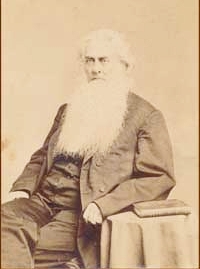 William S. Plumer provided his assessment of John McDowell’s life and ministry in a letter to Sprague regarding the publication of McDowell’s life and letters.
William S. Plumer provided his assessment of John McDowell’s life and ministry in a letter to Sprague regarding the publication of McDowell’s life and letters.
I have been acquainted with Dr. McDowell since 1826. I have often served with him in bodies convened for ecclesiastical and benevolent objects. I have often spent an hour or two with him, though we never were close. Still, I have definite ideas of the secrets of his success. I say secrets, because there were several things of importance that made him what he was.
First, I think he set the Lord always before him. God’s will was his law. God’s honor was his aim. He subordinated everything to religion.
Second, Jesus Christ was precious to him. His preaching and his thinking were evangelical. Tradition says this was so when he was a young man. I know it was so later in life. A brother who loved and honored Dr. McDowell, suggests that an examination of his manuscripts would show that, to an unusual degree, his sermons would be found clearly to explain the way of salvation.
Third, Dr. McDowell never faltered in his belief of the plenary inspiration of the Scriptures. If he was sure that the Bible taught anything, he doubted no more. He was fully persuaded that God’s Word was a fire and a hammer. He never rested his own conclusions on human wit, or speculation, when he could lay hold of God’s testimony. ” What is the chaff to the wheat ?”
Fourth, Dr. McDowell was a practical man. His was no dreamy existence. He lost no time in forming or in attempting to execute impracticable schemes.
Fifth, He was industrious. He was always at work. He was a fisher of men; and if he was not making a draught of fishes, he was mending his nets. In the hot weather of 1835, I spent some weeks in this city. Whenever I called on him, I found him industriously engaged in writing sermons, just as if he had but recently begun to preach.
Sixth, Dr. McDowell was benevolent. He carried no grudges. He was kind to all. He wept with those who wept. If any survivor reproaches himself for any ill treatment of Dr. McDowell, it is quite certain Dr. McDowell carried not to his grave the memory of his wrong. I doubt not he would have said, with one of my correspondents now passed away from earth, ” I would not give one hour of brotherly love for a whole eternity of contention.” He was a man of peace.
Seventh, He always did his best. He never intentionally slighted any part of his calling.
Eighth, I leave quite to others to give you the materials for speaking of the afflictions of his life. But his trials were great. He sometimes spoke of them to me, but always with a cheerful acquiescence in the will of God.
McDowell’s focus was theocentric with an evangelistic thrust based on the fully inspired Word of God; he was practical, industrious, benevolent, always did his best, and did not complain. But Plumer missed two of McDowell’s attributes—his emphasis on catechesis and concern for peacemaking. Plumer hoped his comments about McDowell would help young ministers to set their compasses on the right course for service as they studied the purity and peace of the church.
Barry Waugh
Notes.The header image shows the Old School General Assembly convened in Seventh Presbyterian Church, Philadelphia, May 29, 1861, which was the day before the vote regarding the Gardner Spring resolutions and division of the Presbyterians at the time of the Civil War. It is cropped from a stereo view held by the New York Public Library in their digital collection and is titled, “The General Assembly of 1861.” To read a brief bit about David Austin’s views, see the Joseph Caldwell, 1773-1835, biography on this site. W. B. Sprague’s book about John and William McDowell is titled, Memoirs of the Rev. John McDowell, D.D, and the Rev. William A. McDowell, D.D., New York: Robert Carter & Brothers, 1864. Note that there are two Shepard Kollocks—one of Henry Kollock’s brothers and their father were both named Shepard. E. R. Beadle, The Old and the New. 1743-1876. The Second Presbyterian Church of Philadelphia. Its Beginning and Increase, [1877]. Sprague said, 135, that Alexander asked McDowell to preach his funeral about a month before his death, but I could not find a copy of a sermon; the sermon by John Hall likely resulted from a conflicting schedule for McDowell. Sprague said of Alexander’s instructions to McDowell that, “In connection with this [the funeral], he left a special request that there should be no eulogy pronounced upon him, but that the sermon should be a simple exhibition of Divine truth, suited to comfort mourners, and edify and profit all” (135).
Albert Barnes—Barnes was ordained in 1825. Barnes was tried in an important heresy case in the Presbyterian Church in which he was charged for views contrary to the Westminster Confession of Faith. See on this site the paragraph summary of the Barnes case in the biography of George Junkin. The Barnes case was symptomatic of the influence of the New England Theology in the PCUSA and contributed to events leading to the division of the Schools. [added 6/14/2021]
Regarding Clerks—I checked the Constitution of the Presbyterian Church, 1840, for more specifics about the duties of the Stated Clerk, Permanent Clerk, and Temporary Clerk, but none could be found; there is one paragraph which basically says that all judicatories are to have clerks. Based on the minutes of 1838 it appears the Permanent Clerk was responsible to deliver the manuscript minutes to the Stated Clerk who then did a final editing and had them published. The Temporary Clerk was a


